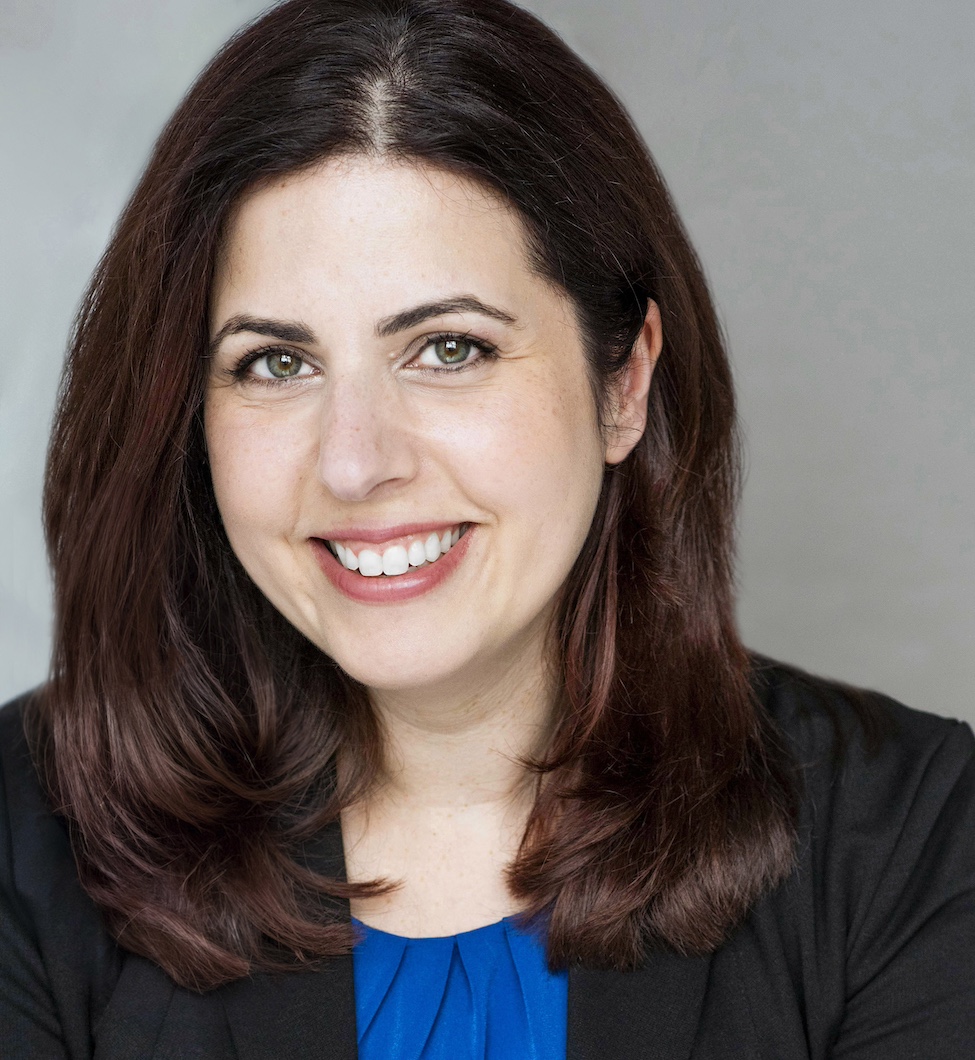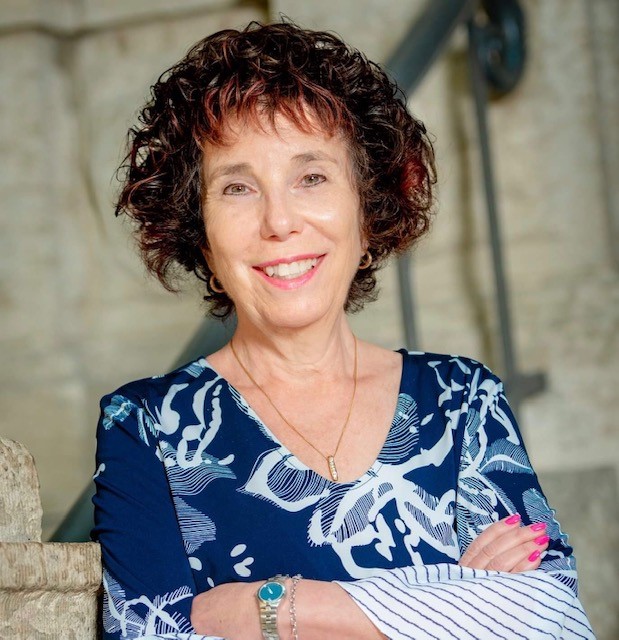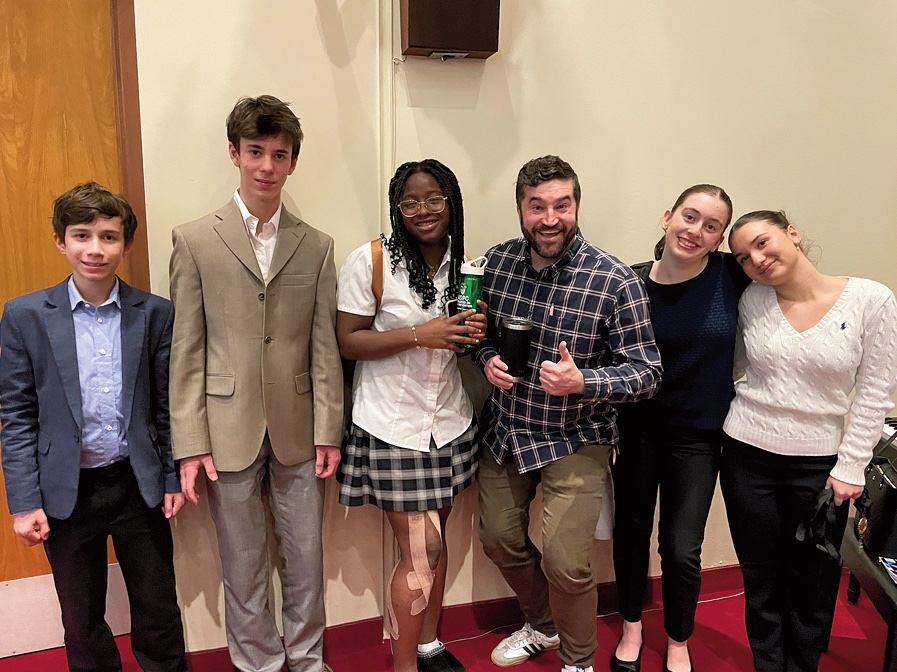Local News
Multi-talented Kelly Robinson continues to shine both on stage and behind the scenes

By MYRON LOVE For regular readers of my articles in The Jewish Post & News over the years, Kelly Robinson’s name is most likely associated with the growing number of students she has taught who who have stood out from year to year at the annual Winnipeg Music Festival in March.
“I teach voice lessons,” says Robinson. “I’m grateful to have such a full studio — over 50 students each week — and it’s delightful to see each student progress and grow their confidence and ability. Many of my former (and some current) students perform professionally themselves. It’s lovely to see.”
The teacher, moreoverr, is also a performer on local stages and behind the scenes. In recent years, she has appeared on stage in performances with the Manitoba Opera Chorus and the Manitoba Underground Opera, Rainbow Stage, Little Opera Company, Dry Cold Productions, and the Winnipeg Fringe Festival. In August, she notes, she sang the role of “Mother” in the opera “Hansel and Gretel” with Manitoba Underground Opera at the Winnipeg Art Gallery. Most recently, she was Music Director for the Manitoba Theatre for Young Peoples “A Year With Frog and Toad” in December.
Currently, she reports, in a real tour de force, she in playing a role on the production team in the Royal Manitoba Theatre Centre’s new production of the musical version of the movie “Waitress” (which starts January 7 and runs until February 1) behind the scenes and she will also be appearing on stage. “I am the Assistant Music Director,” she says. “I worked on the music with the singers in rehearsal to help everyone to sound their best. I played the piano for rehearsals. I am playing keyboard in the orchestra for all of the performances.”
In addition, the “Waitress” band is on stage, interacting with the cast. “That should be a lot of fun,” she comments.
For the daughter of Terry and Freda, a musical career was not on her radar growing up largely in River Heights. The graduate of the Hebrew bilingual program at Sir William Osler School (which lately was transferred to Brock Corydon School) told Winnipeg Fee Press opera reviewer Holly Harris in an interview that appeared The Jewish Post & News in 2017 that her original career goal was to become a dentist.
She was introduced to musical theatre by her drama teacher at Grant Park High School, who encouraged her to audition for that year’s production of “All About Cats”. To her surprise, she was cast in a lead role.
Despite this early introduction to the world of musical theatre, Robinson was still largely fixated on a career in the sciences.
In university, she pursued a four-year degree in microbiology at the University of Manitoba – and excelled. Toward the end of her science program, she recounted to Holly Harris and, despite being awarded full academic scholarships and the prospect of her own prestigious research lab, Robinson realized that her true love was music. She changed course and auditioned for the University of Manitoba’s Faculty of Music.
She did earn her B.Sc. – but she also completed a music degree with a major in Classical Voice Performance and a minor in Composition.
“It was really neat,” she told Harris – about composing music for a string quartet. “Hearing it performed was inspiring. I realized that, in music, there were endless possibilities.”
She furthered her musical education with studies in contemporary vocal styles through Boston’s Berklee College of Music. (Coincidentally, her husband, Josh Eskin, whom she met while both were teaching at a St. Boniface music school, studied guitar at that same institution.)
As a singer, Kelly Robinson has demonstrated a remarkable versatility. In addition to opera and musical theatre, she has done Gilbert and Sullivan – winning the Winnipeg Music Festival’s Gilbert and Sullivan Society Trophy in 2002, a tribute to her Zaida, Harold King. She has fond memories of him singing songs from Gilbert & Sullivan’s “Pirates of Penzance” to her when she was young.
Outside of music, Robinson enjoys crocheting, making jewelry, reading and spending time with Josh and their children – 15-year-old Juliet – also a Winnipeg Music Festival winner – and 11-year-old Dylan.
She is also the High Holy Day Choir Director at Congregation Etz Chayim.
After “Waitress”, Robinson reports, her next project will be serving as Music Director for Dry Cold’s production of “Dogfight,” scheduled for April. The musical – based on the 1991 film of the same name – revolves around another waitress and her encounter with three GIs about to be shipped out to Vietnam in the early days of the war – and the day before the assassination of President Kennedy.
According to the blurb from the theatre company, “ ‘Dogfight’ deals frankly with serious and important subjects that are still relevant in our fractious times of political instability, cyber bullying & intolerance of others”.
It sounds like another winner from the local musical theatre company that focuses on premiering the latest new musicals.
Local News
Cheryl Hirsch Katz, Jewish Child and Family Service’s longest serving staffer, set to retire at end of the month

By MYRON LOVE “I loved working at Jewish Child and Family Service,” says Cheryl Hirsh Katz, who is due to retire at the end of June. “I have always appreciated the warm and welcoming atmosphere here. I feel that the people working here are my extended family. I am going to miss my colleagues”.
“I have derived great satisfaction over the years to have been able to help many people in our community of all ages through my work at JCFS,” she continues.
After 44 years at the agency, Katz, the longest-serving member of the staff, was given an appreciative send-off at the JCFS’s recent (June 23) Annual General Meeting at the Shaarey Zedek Synagogue.
The daughter of Art and Bess Hirsh, Cheryl grew up in Garden City. She attended Peretz School, then Jefferson Junior High and Garden City Collegiate. She joined the staff of JCFS in 1981, shortly after receiving her Bachelor of Social Work degree.
She earned an MSW in 1990.
“I chose to become a social worker,” she recalls, “because I always wanted to be able to help people.”
Katz was originally hired by JCFS to work with newcomers. After a couple of years, she was given responsibility for looking after the needs of older adults.
“I really enjoyed working in older adult services,” she says. “That is where I spent the bulk of my time at JCFS.”
After ten years as a case worker, she was promoted to a supervisory role. Later, she was also given responsibility for mental health and addictions programming and settlement services, while keeping the older adult files under her purview.
“As a supervisor, I wasn’t directly involved with individual clients,” she points out. “I was more involved with programming. Among the programs for seniors we organized were – for example – sessions on elder abuse, digital storytelling and memory loss.”
She notes that one of the trends she has seen over the last 44 years is that people are living longer and living in their homes longer. A lot more of our clients are living well into their 90s,” she observes. “We have had to continually expand our staff and the services we provide in order to accommodate the growing demands of an aging population.”
She also spoke of the mental health needs of seniors and aging Holocaust survivors.
She says that she has mixed feelings about leaving JCFS. “After so many years working full time, I am going to have to create a new routine,” she comments.
She notes that, now that she is retired, she will have more time to spend with her parents – who are in their 90s.
And then, there are the two dogs to look after. “I will have time now to try new activities,” she says. “ I might learn to play mah-jong.”
She speaks about maybe doing some traveling – although her husband, Murray, is still working full time.
(She and Murray have one daughter, Farah.)
“Retirement may also include some volunteering,” she adds.
It is quite likely, she will be continuing her association with JCFS but in a volunteer capacity.
Local News
Gray Academy students shine in provincial, national debating competitions

By MYRON LOVE It has been another good year for Gray Academy’s high school students who participated in provincial and national debating competitions. The best results were recorded by Grade 9 student Noa Mednikov, who finished fourth overall nationally, fourth in interpretive reading, and fifth in persuasive speaking at the junior National Public Speaking Championship in early May in Vancouver.
Last October, in the Junior Provincial British Parliamentary Championship – which was held at St. John’s-Ravenscourt – Noa and her partner, Raya Braunstein, finished third as a team while Raya placed third in individual debating.
Their fellow Grade 9 student Maxim Moscalenkov tied for first in persuasive speaking in Vancouver, while the Gray Academy team of Gabe Tapper and Aaron Koplovich finished fifth. Aaron also finished fifth in his individual debate.
Earlier, in March, Maxim finished fifth in the Provincial Juniors debating competition, which was held at Balmoral Hall He and his debate partner, Nate Shenkarow, finished seventh among the teams entered. Last November, he and partner, Ethan Tenenbein, finished seventh in the Junior Prepared Tournament – just behind the Gray Academy team of Nate Shenkarow and Jack Kay.
At the senior high level in that competition, the team of Jacob Tenenbein and Jonah Novoseller finished fourth and Jacob was recognized as fifth best in an individual capacity. Jonah and Jacob also paired up to win the Asper Cup, which was held at their home school.
Jacob represented Manitoba at the Junior National Speech Championship in Vancouver in May and, last October, he and Grade 12 Gray Academy students Julie Krozkin and Daniel Bokser represented Canada at an international debating tournament in Bermuda.
Gray Academy’s debating program was introduced by Linda Martin in 2003. She also led the debating teams at Balmoral Hall. In 2011, Martin was succeeded by Gray Academy high school English teacher Andrew Kaplan.
“Andrew has done a wonderful job with the debating program” says Martin, who has a debating trophy at Gray Academy named in her honour, as well as a provincial trophy for best individual junior debater. “Over the years, Gray Academy students have done very well in many local, national and international competitions,” she adds.
About three weeks ago, this writer had the opportunity to sit down with Andrew Kaplan and six of the school’s top debaters while they discussed the benefits of learning how to debate. According to Noah Strauss – who competed in the Junior Provincials at Balmoral Hall in March, public speaking leaves him with a feeling of accomplishment.
“It’s a good skill set to have,” he observes. “It builds confidence.”
“A benefit of being able to debate is that you learn how to convince people that you know what you are talking about,” adds Maxim Moscolenkov.
Raya Braunstein notes that being able to debate is a skill that she expects to be helpful in many university courses which she may choose to take.
As Andrew Kaplan notes, the ability to express yourself has a great impact in whatever career you choose to pursue.
He points out that debating is compulsory at Gray Academy for all Grade 7 and 8 students – and students can continue debating as an option in the higher grades
Of course, competitive debating is not for everyone. For those students who opt to take that path, the journey begins with internal school debate competition – with the top debating teams and individuals qualifying for local tournaments and – potentially – beyond.
Andrew Kaplan reports that a small number of high schools in Winnipeg and southern Manitoba have active debating programs – including St. Johns Ravenscourt, St. Paul’s High School, St. Mary’s Academy, Garden City and Maples Collegiates in the Seven Oaks School Division, St. Maurice (a Catholic School), as well as Morden Collegiate and Dasmesh, a Sikh private school.
Kaplan expresses his appreciation to the Asper Foundation and an endowment spearheaded by the Kives Family for providing funding for the Gray Academy debating program – as well as the Andrew Slough Foundation – which was established by his friends in memory of the outstanding former Ravenscourt student debater and lawyer who passed away suddenly two years ago at the still young age of 38.
I am confident that our Jewish community can look forward to the continued success of Gray Academy’s star debaters and to the continual emergence of future stars as the times goes by.
Local News
Antisemitism has crept into grade school in Canada

Antisemitism in Canada has moved beyond protests and politics; it is now entering classrooms and altering how Jewish children see themselves functioning within them.
A a university student I have observed the experience of my younger brother in grade eight as a Jewish student. Over the past few months, his school has been at the center of several deeply troubling incidents that have made him feel unsafe in our parks, community, and even his school. Swastikas were drawn around the community, in parks and ponds. Additionally, an older man, who claims to be a pro-Palestinian influencer, stood outside his predominantly Jewish school wearing a keffiyeh, filming a video which then circulated between students on TikTok.
This same man later showed up to our local Jewish community center in keffiyeh to allegedly watch his son play basketball where my brother and many of his classmates go for their lessons, basketball games, and Jewish events. These moments made him and his peers feel watched and targeted just for being Jewish. Local political representatives condemned the incidents and raised awareness about antisemitism, but the fear among students didn’t go away. The feeling of being targeted for simply existing has been taught to my brother, something my parents had tried their hardest to escape from.
Most recently, my brother was chosen to represent his school at a regional science fair. When one of the judges arrived wearing a keffiyeh, he froze. For many, including my brother after the incidents he has faced, the keffiyeh represents a political message. But even more so for my younger brother, it is tied to the fear and intimidation he had already experienced. He felt nervous, distracted, and unsure of how to act.
This is not about silencing political expression. It is about a child who came to share his ideas and left feeling uncertain and afraid. It is about the atmosphere forming in Canadian schools, where Jewish students are being made to feel targeted and unwelcome.
His school made an effort to address the incidents, but the impact is lasting. Posts on social media, much can be very vague at times about inclusion cannot fully undo the feeling of being singled out. A kind word from a teacher does not erase the fear that builds when threats are left unspoken but deeply felt.
I am writing this as a sister who watched her younger brother lose a moment that should have been filled with confidence and pride. He deserved to feel safe. So do all Jewish students in this country.
Moving forward, schools must take concrete steps to protect all students. Antisemitism cannot only be addressed when it becomes violent or overt. It must also be recognized when it appears as intimidation, symbolic targeting, or political messaging that creates fear among students. Children should never have to question whether they are safe in their own classrooms or community spaces.
Events that are meant to support and celebrate students must remain focused on them. Individuals who feel the need to bring political symbols or messages into school grounds or children’s events should not be welcomed in those spaces. Schools must make it clear that their environments exist to support learning, safety, and inclusion, not to host agendas that can intimidate or isolate students.
Administrators and educators must develop clear guidelines for identifying and responding to antisemitic behavior in all its forms. This includes strengthening security measures, offering ongoing staff training, and engaging directly with Jewish families to understand their concerns. Inclusion is not a one-time statement. It is a responsibility that must be reflected in everyday decisions and actions. No child should ever feel unsafe or unwelcome because of their identity.
The author is a Campus Media Fellow with HonestReporting Canada and Allied Voices for Israel who lives in Toronto.


